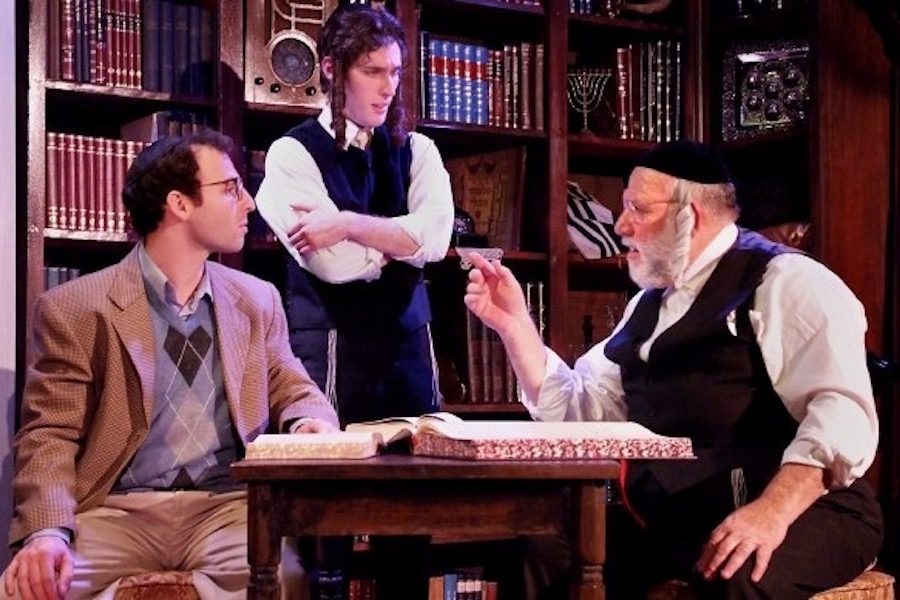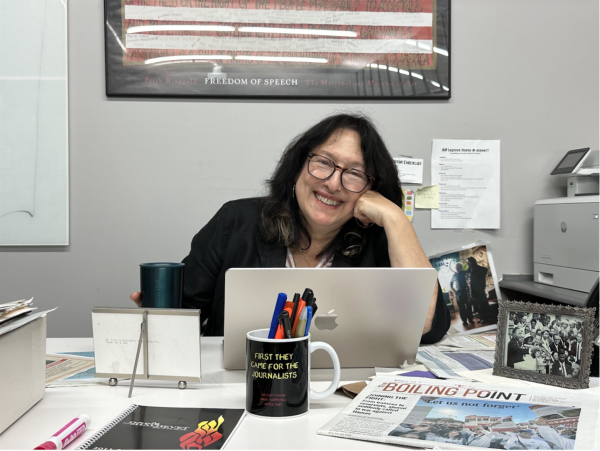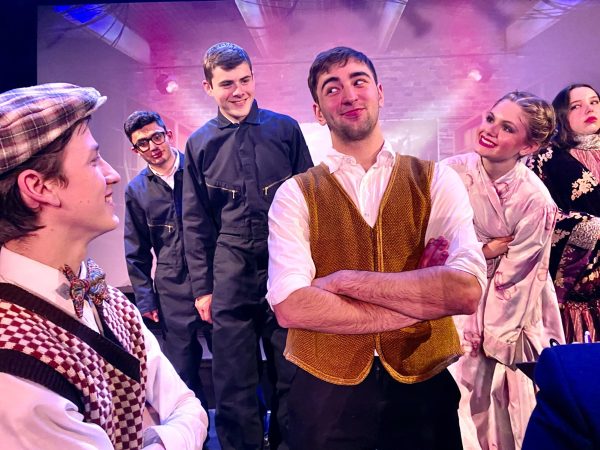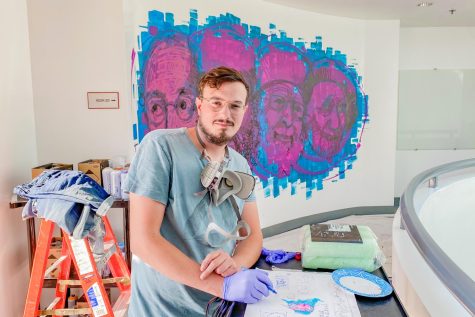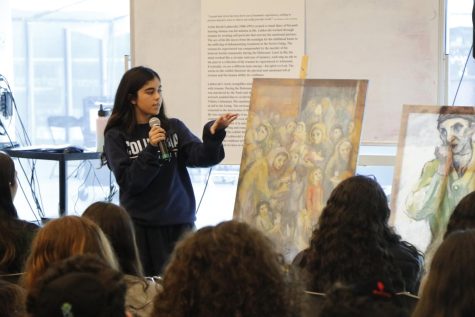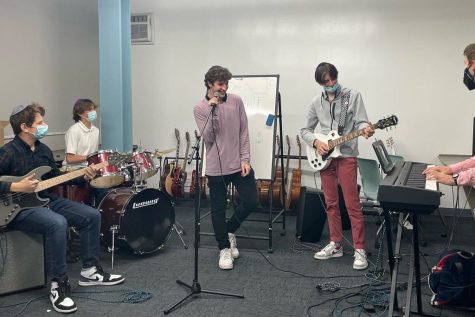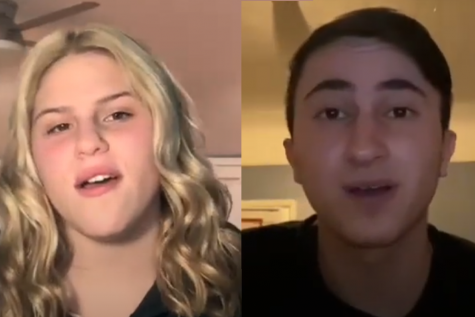Rabbi Bouskila’s journey comes together on stage in ‘The Chosen.’
Chaim Potok’s novel cleared a path for him as a young man; now he helps make it accessible to others
When Judaic Studies teacher Rabbi Daniel Bouskila was 12 years old, he aspired to be an actor. With a father in the entertainment industry as a wardrobe specialist, Rabbi Bouskila easily found an agent and headshots.
His first audition was for a role as an Arab prince in The Six Million Dollar Man. He did not get the part. Instead, Tony-award winning actor Barry Miller did. Later on, Mr. Miller played the role of Reuven Malter — the son of a Modern Orthodox rabbi and professor — in the movie adaptation of Chaim Potok’s The Chosen.
Even though Barry Miller stole his part of the Arab prince, Rabbi Bouskila said Miller’s Reuven Malter had a big impact on him when he was in high school at YULA, and later in yeshiva. Reuven’s modernity presents a challenge to the character of Danny Saunders, son of the ultra-Orthodox, Reb Saunders. The two become an unlikely duo after Danny hits Reuven in the eye during a heated baseball game.
Thus began a journey for Rabbi Bouskila that has come full circle more than once, most recently with a new production of The Chosen in East Hollywood, with which he has been closely involved.
Rabbi Bouskila says he grew up in “in a world full of Reb Saunders,” his Hollywood aspirations notwithstanding. Though he always loved studying Talmud, he thought he could never become a rabbi because having a big white beard and being Hasidic did not appeal to him. So Reuven Malter’s critical, modern approach to Jewish texts inspired him — even though Miller had stolen his first role.
Then about 10 years ago, Rabbi Bouskila saw Barry Miller in a coffee shop. He approached him and told him how much he admired his work, especially in The Chosen. He also told him about missing out on the part as an Arab prince. The actor asked Rabbi Bouskila if he ever ended up pursuing an acting career. Rabbi Bouskila said, “No, I did what you did in The Chosen. I became a modern rabbi.”
“You’re much better off than me,” Miller replied.
This story came together again this year when The Fountain Theatre in East Hollywood opened the on-stage adaptation of The Chosen, and Rabbi Bouskila helped direct the scenes involving Talmud study; he also contributed approximately 15 boxes of his Judaica books to the set. He knew the first actor who played Reb Saunders, Alan Blumenfeld, because Blumenfeld had played Shylock in The Merchant of Venice. Some say Shylock was a Sephardic Jew, so Rabbi Bouskila helped the actor incorporate some of that into his role.
In The Chosen, Rabbi Bouskila directed a lot of the scenes of Rabbi Saunders, played at first by Alan Blumenfeld and now by Steve Green.
In particular, he helped with the scenes where he was teaching gematria, which interprets Hebrew words to have religious meaning based on the numerical value of the words’ letters.
“He was being too professorial,” Rabbi Bouskila said of Mr. Blumenfeld, in an interview at school. “A rebbe is not like a Talmud teacher, he’s not a professor, he’s a spiritual leader. He has to constantly be drawing from Heaven, like it’s prophecy — he’s not conveying information, he’s inspiring people with these beautiful words of wisdom.”
Indeed, at a recent performance of the new production, the actor’s Reb Saunders did frequently look to the sky, then back to his son or the congregation, nearly chanting his sermons or thoughts as though he was praying.
Rabbi Bouskila joked about being a Sephardic rabbi teaching actors how to sound Yiddish.
The scenes involving Talmud study were also revamped under Rabbi Bouskila’s direction. He read passages to the cast so they could hear the rhythm of halacha, Jewish law, which has a distinct chant when read aloud.
In one scene, Reuven Malter, Danny Saunders and Rabbi Saunders are studying tractate Yevamot. On stage, they are open to the actual page in a book of Talmud that Rabbi Bouskila lent them. He said they even put sticky notes on the right page so “the scene is taking place on the real page of Talmud.”
He said he was prompted to donate books when he looked at the set. The stage is split in two: one side is the library of Rabbi Saunders, and the other side is the library of Reb Malter.
Rabbi Saunders’ side is filled with books of Talmud and other traditional books. Reb Malter’s side is filled with modern analysis of texts, as well as books on Zionism, something to which the Saunders crowd is vehemently opposed.
The book selections visually convey the philosophical and religious differences between Danny and Reuven; between insular, traditional Judaism, and modern Judaism. Danny and Reuven frequently walk back and forth across the stage, a metaphor for how their friendship puts them in both worlds.
“The library is in your face, and it’s almost like a character in the show,” Rabbi Bouskila said.
It also begs the question: Can those two worlds co-exist in real life, as they do so literally on stage?
At the time of the book’s publication in the 1960s, this question of how to live a Jewish life and how to study Judaism in America was roiling the Jewish community. Now, the division is set in stone with the Modern Orthodox movement, in which texts are acceptably studied through a more critical lens and secular subjects are embraced, having its own synagogues, rabbinical schools and yeshivot.
But of course, the theme of polarization is timeless, still prevalent in today’s world.
“Can different truths co-exist?” Rabbi Bouskila said. “Could Trump voters and Hillary voters coexist in a family, in a classroom, in a relationship? Could Hasidic Jews and IDF soldiers coexist in an IDF unit?”
So it was perfect that two Shalhevet English classes, General Studies Principal Mr. Daniel Weslow’s 10th-grade American Literature class and Ms. Na’amit Nagel’s SAS Jewish Literature class, attended a showing of the play together on Feb. 26.
The production was supposed to end in March, but it sold out, so the theatre extended it to the end of May, and there is a chance it could go into June.
Rabbi Bouskila is still drawn to it.
“I have gone to see the show four or five times,” Rabbi Bouskila said. “But I was really thrilled to see Shalhevet students there. I thought, this play was made for Shalhevet, with all the debates we have on modernity and philosophy and Zionism.”
For Rabbi Bouskila, this might be just the beginning. He has begun helping direct a new play called The Immigrant, which has the same director, Simon Levy, as The Chosen.
He appreciates the theatre world in a different way from the screen world.
“I see stage as a medium that has a medium to send messages and educate,” he said. “TV and film is too polished for my taste. Theater is more raw and has a personal message. The people in theater are very different and more to my personal philosophy and way of looking at the world. So I’m actually thrilled to be doing it in this context.”
With one foot in the entertainment world, and one foot in the rabbinic world, he might better off than if he had gotten the part as the Arab prince.
“The entertainment industry is a very challenging on a personal level on your family,” he said, recalling his father’s experiences in the entertainment world.
“I’m happier in this way,” Rabbi Bouskila said. “When Barry said, ‘You’re better off,’ I think he knew what he was talking about.”
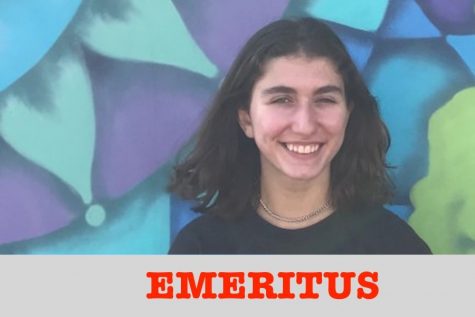
Hannah Jannol was Editor-in-Chief of the Boiling Point during the 2017-2018 school year. Since then, she has attended The New School and written for their HerCampus chapter; edited obituaries for The Trace; written poetry for Eleven and a Half literary magazine, and run Instagram and Twitter for Uptown Stories. Her favorite parts of being on Boiling Point were production night and writing long-form features stories, many of which won awards from CSPA, Quill & Scroll and the American Jewish Press Association.

